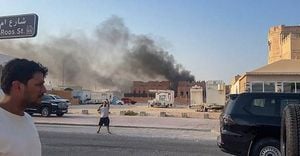Residents of Yaroslavl and Moscow have faced significant disruptions to mobile internet services in the days leading up to the Victory Day celebrations, raising concerns and frustrations among users. On the evening of May 6, 2025, Yaroslavl residents began reporting unstable mobile internet connections, with many unable to access communication services after leaving their offices. One local, Ksenia, shared her experience, stating, "As soon as I left the office, I was cut off from both communication and internet until I got home. My husband faced the same issue." Another resident lamented that they couldn't even pay for transportation through an app due to the outages.
According to the Ministry of Regional Security, the disruptions were due to temporary restrictions on mobile internet services, implemented in response to threats posed by unmanned aerial vehicles (UAVs). These measures were part of a broader strategy to ensure public safety amidst rising tensions.
The situation escalated on May 7, as Muscovites reported similar issues, particularly after 08:30 AM. Many users found themselves unable to send or receive messages on popular messaging platforms, leading to widespread frustration. One Muscovite noted, "After 08:30, mobile internet was completely down in central Moscow. Nothing was loading." Reports indicated that all major operators, including Beeline, MTS, MegaFon, T2, and Yota, were affected, with data from the service sboy.rf confirming the outages.
As the disruptions continued, the Russian Emergency Situations Ministry (RCSChS) had previously warned citizens to expect interruptions in mobile communications and internet access during the May holidays, attributing these to security measures in place for the upcoming celebrations. A notification from Sberbank also alerted customers that access to their banking app might be compromised during this period.
In a broader context, mobile internet outages were reported across dozens of Russian regions, including Tula, Tver, Saransk, and Kursk, with the Yaroslavl region's authorities confirming that these restrictions were enforced to mitigate potential drone attack threats. The disruptions have been particularly pronounced in St. Petersburg, where 22% of complaints about Yota services originated, according to Downdetector. Other regions reporting significant issues included Sakhalin (11%), Astrakhan (10%), Leningrad (10%), and Voronezh (8%).
Anton Nemkin, a member of the State Duma Committee on Information Policy, explained that such temporary outages during significant events are a preventive measure to protect citizens from potential threats. He emphasized that these measures are not intended to restrict rights or impose censorship but are necessary for public safety. "These outages primarily affect devices relying solely on mobile connections," Nemkin stated. "We should not confuse any application issues with these restrictions."
Despite the government’s assurances, many citizens have expressed dissatisfaction with the situation. Complaints have poured in from users who find themselves unable to connect with family and friends during a time of heightened security. The frustrations have only intensified as the Victory Day parade approaches, which is expected to draw numerous foreign delegations to Moscow. In preparation, military equipment and soldiers have been rehearsing in Red Square, further contributing to the heightened security atmosphere.
Meanwhile, Moscow's airports have also faced operational challenges due to the ongoing security measures. All four major airports were temporarily closed for several hours, leading to numerous flight delays and cancellations. Vnukovo closed on the evening of May 6 and reopened at 4:00 AM on May 7, while Sheremetyevo faced limitations starting at midnight. Domodedovo, however, remained closed to incoming and outgoing flights since 6:00 PM the previous day.
One particularly troubling incident involved an Aeroflot flight from Istanbul, which was diverted to Kazan before being redirected to St. Petersburg's Pulkovo airport, where it remained for hours. A passenger on that flight, Victoria, recounted the harrowing experience, stating, "We took off from Istanbul at 15:50 and were informed during our approach to Moscow that we would make an emergency landing in Kazan. After being held there for two and a half hours, we were told we were heading to Moscow, but instead, we circled over the city for another hour. Eventually, we were sent to Pulkovo, where we waited for hours without water."
As the situation evolves, authorities continue to monitor the mobile service disruptions closely. With the Victory Day celebrations set to commence soon, the government is under pressure to ensure public safety while minimizing the impact on everyday communications. As the countdown to May 9 continues, citizens are left grappling with the fallout from these significant security measures, hoping for a swift resolution to the ongoing connectivity issues.







